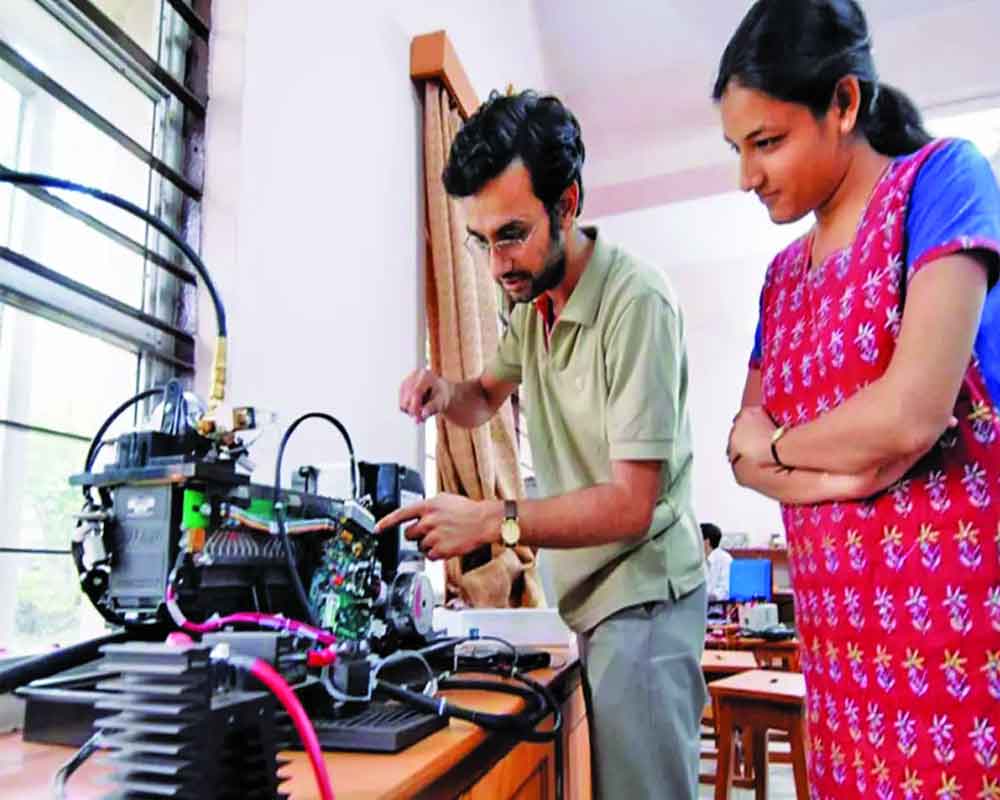Skilling institutions have seized opportunities to make a difference as new opportunity knocks at India
Even though the first Industrial Training Institute (ITI) was established in 1950 and around 10,000 ITIs were opened in the country in the following seven decades, it took 72 years for the first-ever convocation of ITI students. This fact is another example which proves that in India, skilling has been a neglected area for policymakers.
It was only in the eleventh five-year plan that skill development got a chapter for it. However, since then there had been a steady increase in its importance and a dramatic change happened when Narendra Modi took charge of the country. Enhancing the employability of Indian workers through world-class skill training has been a major thrust area in the past eight years.
If we closely examine the Prime Minister’s approach to skilling, three major dimensions appear. One, bring skill development to the centre of policy
making. In 2014, a separate ministry to look at skills came into existence and one of the early flagship programmes of the
government was ‘Skill India’. The efforts paid off and nearly 5,000 new ITIs
have been opened in the country and
over four lakh seats have been added in the last eight years.
Annually, more than one crore youth has been joining and benefitting from the ‘Skill India’ programme, a Mission under the Ministry to equip youth with skills for better livelihood. More than 1.3 crore candidates have been trained under PMKVY, and numbers will surely increase in the future as the Centre is going to open more than 5,000 new ‘Skill Hubs’ to promote skill development in India.
Increasing the aspirational value of skill development and its integration with formal education has been the second dimension of the Prime Minister’s approach. It has been mentioned on many occasions that knowledge must not be limited to academic qualifications only, skill to do something is equally important and this skill must be treated as equivalent to the other qualifications. This idea is best spelt out in the National Education Policy, which encourages experience-based learning.
The Prime Minister considers skill development as the way to develop a future-ready workforce and this brings us to the third dimension of his approach, i.e., research to understand the changing world of work and be proactive and agile in formulating the policies and designing the action. If we look at the recent speeches of the Prime Minister, especially his address to the national labour conference where he not only mentioned Industry 4.0 and robotics but also underlined the change in the employment relations like work from anywhere and flexible working hours. He called these changes opportunities for women’s labour force participation and asked the labour ministry which is preparing its vision for 2047 in ‘Amrit Kaal’ to think in the direction of what can be done for women in the newly emerging sectors in the country.
When we look from this perspective, the Prime Minister’s address at ‘Kaushal Dikshant Samaroh’ of ITI looks like a follow-up. Unlike the National Labour Conference, this time the PM was talking to a heterogeneous group that consisted of students as well as policymakers. So, this time he had tasks for both of them. Highlighting that job opportunities in the country are also rising with the advancement of
technology, he asked students to upgrade their skills in line with the future with the mantra of ‘Skilling, Reskilling and Upskilling’, while keeping an eye on the latest
developments in their fields.
At the same time, he also emphasized that as India is taking a lead in the fields of renewable energy, solar power, and electric vehicles, the introduction of courses related to these areas in several ITIs will further facilitate job seekers. If we look at India’s journey since independence, it is a sad state of affairs that despite establishing a few institutions that find themselves among the world leaders in research, a culture of research and development with the aim to lead the world failed to develop. It happened in the field of science, social science, business and also in policymaking. The Prime Minister tried to address the issue from the very beginning, and the formation of NITI Aayog was meant for this purpose only.
Besides, there is also PM-EAC that advises the Prime Minister on economic issues. But, similar arrangements at the level of different ministries and institutions, that not only understand the Prime Minister’s vision but decode it in the light of the mandate of that ministry or institution needs further strengthening.
If we limit ourselves to the labour ministry, which is responsible for looking after the largest chunk of our population and directly addressing the issues coming up because of the changing world of work, it has two institutions that have the mandate for labour market research -- VV Giri National Labour Institute and Dattopant Thengadi National Board of Workers Education and Development (DTNBWED). These institutions served the country well during the second and third industrial revolutions.
We were laggards during the first three industrial revolutions but one of the leaders in industry 4.0. We are ahead of many
developed countries in digital infrastructure and this lead is going to be there at least for the near future. We need a similar lead in terms of labour market
regulations and the employability of our workforce. The labour codes especially the one that deals with social security are very much open-ended and have a futuristic approach like the importance of the gig and platform economy. DTNBWED has taken a few steps in this direction, as it signed one MoU with Motilal Nehru National Institute of Technology (MNNIT) for resource sharing and another with Indira Gandhi National Open University (IGNOU) that paves the way for diploma and
certification of the workers. The courses aim to promote digital
literacy, promote new age trade unionism, produce certified experts on labour laws and build capacity.
But a lot needs to be done on the employability front to realize the potential of the emerging
sector. As the International Labour Organization (ILO) stated that a large part of the success in the era of industry 4.0 depends upon the workers being pre-informed about the new emerging sectors and skilled for new job roles. It enables them to make better educational and training choices, and the country also gets benefited because of better use of skills and human capital development. The proactive identification of the future skill requirement, and their impartation requires a high level of
synchronization between different institutions, agility and focus on fundamental research.
We are also looking to certify the skills of the unorganized workers registered on e-Shram with the help of the institutions and schemes meant for this purpose. The era of Industry 4.0 is going to be very different. To successfully meet the new challenges and maintain the position of leadership, not only the Ministry of Labour and Employment, but its institutions also need to immediately re-calibrate themselves for the future, because as the Prime Minister himself said the ‘Fourth Industrial Revolution’ requires quick decisions and fast implementation.
(The author is Chairman, Dattopant Thengadi National Board of Workers Education and Development)


























